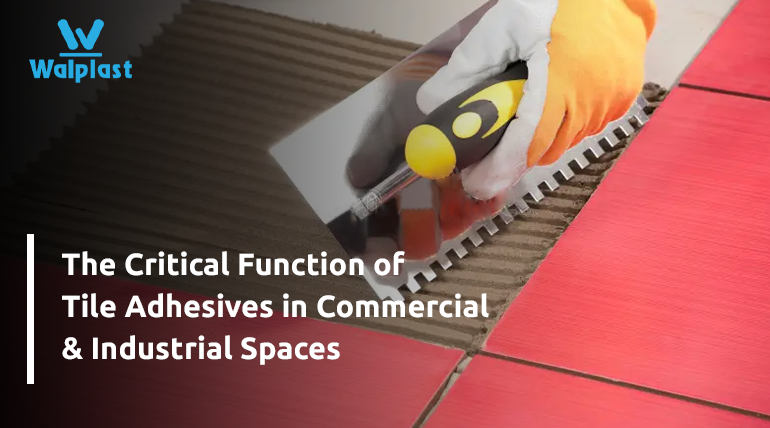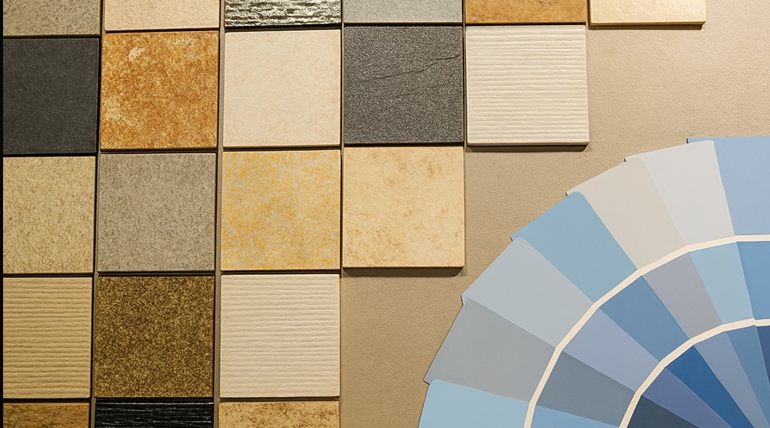
These days, tiles are not just for decoration. In today’s fast-paced world of infrastructure, tiles are chosen for their strength, hygiene, and aesthetics in commercial and industrial projects.
Recently, tiles have become a popular choice for floors and walls in factories, food processing plants, and large shopping malls. However, what really determines their performance is the adhesive beneath the tiles. The choice of adhesive directly impacts durability, safety, and cost efficiency.
Traditional methods like sand-cement mortar are no longer sufficient. This blog explains why tile adhesives are indispensable in commercial and industrial settings. Choosing the right adhesive ensures safety, long-lasting results, and reduced costs.
Essential Facts About Tile Adhesives
- Commercial and industrial projects require tile adhesives that can withstand traffic, machinery, moisture, and temperature changes.
- Sand-cement mortar crumbles, shrinks, and is not water-resistant.
- Superior bonding, flexibility, and moisture/chemical resistance make adhesives durable and faster to install.
- Cement-based, polymer-modified, epoxy, and quick-set adhesives are suitable for different tile types and environments.
- Long-term performance depends on proper surface preparation, thorough mixing, and precise application.
- Ignoring adhesive quality leads to tile failures, higher costs, and safety risks.
Why Tile Adhesives Matter More in Commercial & Industrial Projects
Business and industrial environments face far harsher conditions than homes:
- Footfall and load-bearing pressure: Airports, shopping malls, and hospitals see thousands of daily visitors, putting immense stress on floor tiles.
- Heavy equipment: Factories, warehouses, and workshops demand floors that can handle static loads and vibrations from heavy machinery.
- Water, heat, oils, and chemicals: Industrial kitchens, labs, and chemical plants expose floors to harsh conditions.
- Temperature changes: Outdoor business areas, production units, and cold storage facilities experience rapid temperature variations.
Tiles in such spaces need strength, slip-resistance, and dimensional stability. This performance is only possible with the right adhesive.
Limitations of Traditional Sand-Cement Mortar
For decades, sand-cement mortar was the go-to method for fixing tiles. But for today’s commercial and industrial projects, it falls short:
- Low Bond Strength: Mortar is rigid and struggles to bond with large vitrified or porcelain tiles.
- Uneven Application: Loose mortar creates hollow spots, reducing stability.
- Shifting and Cracking: Mortar shrinks and cracks as it dries, weakening the bond.
- Poor Water Resistance: Mortar absorbs water, leading to leaching and separation.
- Longer Curing Time: Mortar requires extended curing, delaying fast-track projects.

Modern adhesives solve these problems effectively.
Key Benefits of Tile Adhesives in Commercial & Industrial Settings
- Superior Bonding Strength
Polymer-modified adhesives provide excellent adhesion between substrate and tiles. This is essential for large-format tiles, glass mosaics, and natural stone commonly used in commercial projects. - Flexibility Under Stress
In factories and airports, structures expand, contract, and vibrate. Adhesives can absorb such movements, preventing tile displacement or cracking. - Water & Chemical Resistance
Specialized adhesives withstand exposure to oils, water, and chemicals in hospitals, food plants, and laboratories. - Faster Construction Timelines
Unlike mortar, adhesives do not require water curing. Most adhesives allow light foot traffic within 24 hours, with heavy load-bearing possible in 24–48 hours depending on the formulation. This accelerates project completion. - Durability & Cost Efficiency
Adhesives may cost more initially but last longer, reducing maintenance and repair needs. Over time, this ensures significant cost savings.
Types of Tile Adhesives for Commercial & Industrial Applications
The right adhesive depends on tile type, substrate, and environment:
- Cement-Based Adhesives: Suitable for ceramic and small to medium vitrified tiles on floors and walls. Common in small to mid-scale projects.
- Polymer-Modified Adhesives: Ideal for porcelain, natural stone, and large-format tiles in high-traffic areas. Provide added flexibility and strength.
- Epoxy-Based Adhesives: Highly resistant to chemicals, oils, and moisture. Preferred in labs, chemical plants, and industrial kitchens where hygiene and durability are critical.
- Quick-Set Adhesives: Designed for fast-track projects such as airports, malls, or retail spaces where downtime must be minimized.
Conclusion
Tile adhesives are the hidden backbone of commercial and industrial flooring. They ensure surfaces withstand heavy loads, chemical exposure, and high traffic—while maintaining aesthetics.
When businesses select and apply the right adhesive, they reduce costs, enhance safety, and extend tile lifespan. Companies like Walplast produce advanced adhesives that empower industries to build with confidence and lasting results.

Key Insight: The choice of adhesive is not just a technical detail—it is the foundation of durability, safety, and aesthetics in modern commercial and industrial spaces.
FAQs
- Why are tile adhesives better than traditional mortar in industrial projects?
Tile adhesives bond more effectively, remain flexible under stress, and resist water and chemicals—unlike mortar, which cracks and shrinks. - Can tile adhesives handle heavy machinery loads in factories and warehouses?
Yes. Polymer-modified and epoxy adhesives are designed to withstand load pressure, vibrations, and temperature variations. - How soon can a commercial floor be used after tiling with adhesives?
Most adhesives allow light traffic within 24 hours, and heavy use within 24–48 hours depending on the formulation. - Are tile adhesives suitable for outdoor use?
Absolutely. Adhesives are designed to withstand temperature changes, rain, and UV exposure, ensuring tiles stay intact on terraces, façades, and exterior walls. - Can tile adhesives be used for tile-on-tile applications?
Yes. Specialized polymer-modified tile adhesives are designed for tile-on-tile fixing. They provide excellent bonding without the need to remove old tiles, saving time and labor. However, the existing tiled surface must be structurally sound, clean, and free from oil, grease, or loose particles before applying the adhesive.5.
